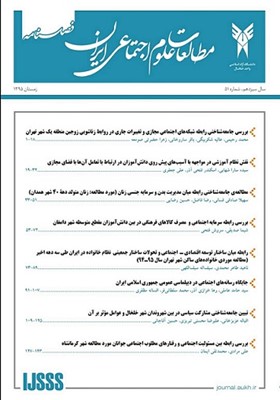تحلیل الگوهای پارادایمی سیاست تولیدمحور صنعت نفت و پیامدهای آن بر جامعۀ محلی همجوار (مورد مطالعه: ساکنان حوزۀ میدان نفتی دارخوین)
محورهای موضوعی : خانواده
1 - دکتری جامعهشناسی سیاسی، واحد علوم و تحقیقات، دانشگاه آزاد اسلامی، تهران، ایران
2 - استاد گروه جامعهشناسی، واحد علوم و تحقیقات، دانشگاه آزاد اسلامی، تهران، ایران
کلید واژه: مسئولیت اجتماعی, جامعه محلی, صنایع نفت و گاز, فرودستان, نظریۀ بنیانی,
چکیده مقاله :
در یکصد سال اخیر، جامعه محلی پیرامون میدان نفتی دارخوین حضور نمادین سه نمایندۀ توسعۀ صنعتی شامل کشت و صنعت نیشکر، نیروگاه اتمی و صنایع نفت و گاز را تجربه کردهاند. تسلط سیاستهای توسعۀ صنعتی تولیدمحورانه از یکسو پیامدهای محیطزیستی، اجتماعی، فرهنگی و سیاسی و از سوی دیگر تجمع مطالبات و صداهای ناشنیدۀ ساکنان این منطقۀ ژئوپلتیکی را دربر داشته است. این پژوهش با هدف ارائه تصویر و تأملی بر چگونگی شکلگیری وضعیت موجود بر پایۀ رهیافت نظریۀ بنیانی از مصاحبههای میدانی با مسئولین و کارکنان صنعت نفت سامان گرفته است. سیاستهای کارگزاران صنعت نفت در چهار الگوی پارادایمی بیاعتمادی، نادیدهانگاری، اولویت منافع (کوتاهمدت، فردی، سازمانی و ملی) و تعامل مشروط بازشناسی و از درون آنها پدیدۀ مرکزی بیگانگی پدیدار شده است. این سیاستها در کنار عواملی همانند کمبود شناخت از بافتار اجتماعی-زیستمحیطی محل انجام پروژهها، نوپایی و نبود رویۀ یکپارچۀ کاربست مسئولیت اجتماعی شرکتها و نیز فشار هنجاری خردهفرهنگهای محلی و سازمانی، پیامدهایی را در سطوح مختلف جامعۀ محلی در بر داشته است. پیامدها در سطح اجتماعی به نابودی اقتصاد سنتی، بیاعتباریِ دانش محلی، آلودگی و تخریب محیطزیست، افزایش تنشهای امنیتی-قومیتی انجامیده و در ابعاد فردی نیز در پدیدههای کارجویی دایمی، احساس ناامیدی- انزوا- بیقدرتی- ناتوانبودگی و وابستگی همراه با بیاعتمادی متقابل پدیدار گشتهاند.
Darkhovein oil field local community, along last century. have been encountered to sugarcane industries, nuclear power plant and oil and gas industries as three iconic symbols of the industrial development. The production-oriented policies domination, has had the environmental, social, cultural and political implications and caused accumulation of claims and unheard voices of the inhabitants of this geopolitical region. In the current essay by applying Grounded Theory (GT) approach among the oil industry officials and staff, we made an effort to give an explanation to the present status. The policies adopted by oil industry practitioners have been identified in four paradigm models: distrust, ignorance, interest preferences (short-term, individual, organizational) and conditional interaction and within them the Alienation, as the core phenomena, has been emerged. These policies, along with factors such as the lack of, the socio-cultural-environmental context of projects, the newness and lack of integrated implementation of corporate social responsibility(CSR) as well as the normative pressure of the local and corporate subcultures, have yielded various results and affected on the local community both social and individual dimensions. At social dimension,, consequences have led destruction of the traditional economy, the disruption of Indigenous knowledge, pollution and environmental degradation, increasing ethnic-security tensions.َAt individual dimension phenomena as life time job-seeking, feeling hopelessness- inefficiency- powerlessness -isolation, and dependency with mutual distrust have been emerged.
_||_

